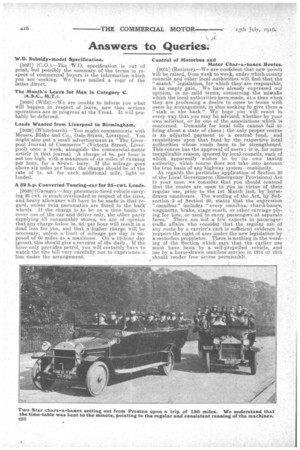Answers to Queries.
Page 22

If you've noticed an error in this article please click here to report it so we can fix it.
W.D. Subsidy-model Specification.
[3027] (0.0.).—The W.D. specification is out of print, but possibly the summary of the terms in respect of commercial buyers is the information which you are • seeking. We have mailed a copy of the latter direct.
The Month's Leave for Men in Category C. (A•S.C., M.T.).
[m] (Wife).—We are unable to inform you what will happen in respect of leave, now that serious operations are in progress at the Front. It will probably be deferred.
Loads Wanted from Liverpool to Birmingham.•
[3029] (Whitchurch).—You might communicate with Messrs. Blake and Co., Dale Street, Liverpool. You might, also put a small advertisement in "The Liverpool Journal of Commerce" (Victoria Street, Liverpool) once a week, alongside the commerciad-motor article in that journal. A chargeof 8s. per hour is not too high, with a maximum of six miles of running per hour, for a 50-ewt. lorry. If the mileage goes above six miles per hour, the charge should be at the rate of is. 4d. for each additional mile, light: or
• loaded.
A 52 h.p. Converted Touring-car for 25-cwt. Loads.
[3030] (Garage).—Any pneumatic-tired vehicle carrying 25 cwt. is much overloaded in respect of the tires, and heavy allowance will have to be made in that re. gard, unless twin pneumatics are fitted to the back wheels. If the charge is to be on a time basis, to cover use of the car and driver only, the other party supplying all consumable stores, we are of opinion that any charge below 3s. 6d. per hour will result in a dead loss for you, and that a higher charge will he necesSary, unless a limit of mileage per clay is -imposed of 60 miles as nmaximum. On a 12-hour day (gross), this should give a revenue of 42s. daily. If the hirer only provides petrol, you will certainly have to watch the tire bill very carefully not to experience a loss under the arrangement. Control of Motorbus and Motor Char.-a.banes Routes.
[3031] (Resister).—We are confident that new points will be raised, from week to week, under which county councils and other local authorities will find, that the "snatch" legislation, for which theaeare responsible, is an empty gain. . We have already expressed our opinion, in no mild terms, concerning the miastaie which the local authorities have made, at a time when they are professing a desire to come to terms with users by arrangement, in thus seeking to give them a "stab in the back." We hope you will resist in. every way that you may be advised, whether by your own solicitor, or by one of the associations which is concerned. Demands for local tolls cannot fail to bring about a state of chaos ; the only proper course is an adjusted payment to a central fund, and. requisitions upon that fund. by the respective local authorities whose roads have to be strengthened. This course has the approval of users'; it is, for some inexplicable reason,. ignored. by local councils, each of which apparently wishes to be its own. taxing authority, which course does not take into account the true basis of any highway system—continuity.
As regards the particular application of Section 20 of the Local Government (Emergency Provisions) Act to your case, we consider that you should contend that the routes are open to you in virtue of their regular use, prior to the 1st March last, by horsedrawn omnibuses. The wording of the Act, by Subsection a of Section 20, states that the expression "omnibus" includes "every omnibus, char-it-banes, wagonette, brake, "stage coach, or other carriage plying for hire, or uged to carry passengers at separate fares." There are not a few experts in. passengertraffic affairs who consider that the regular ush of any route by a carrier's cart is sufficient evidence to support the right of user under the new legislation by a motorbus proprietor. There is nothing in the wording of the Section which says that the earlier use must have been by a self-propelled vehicle, and use by a horse-drawn omnibus service in 1914 or 1915 should render free access permissible.
























